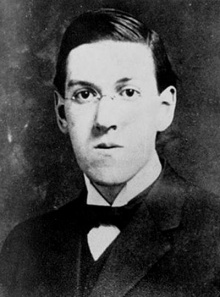Howard Phillips (deceased)
From GURPSworld Wiki
Howard Phillips (b. August 20, 1890) is a noted American journalist and author of pulp fiction.
As a 20-year old college student Phillips traveled cross-country to attend the first aviation meet in Los Angeles. While there, he met William Randolph Hearst, who was taking his first airplane flight. Phillips interviewed Hearst before and after the flight. The millionaire was impressed by the young journalist and published the interview in the Los Angeles Examiner. Phillips returned to his hometown of Providence, Rhode Island, where he graduated from Miskatonic University and became a working journalist in nearby Boston. He achieved national notoriety in 1923 when he infiltrated a gang of bootleggers and published a series of stories written from undercover which exposed not only criminal organizations in Providence but also the complicity of local and state police. The stories resulted in numerous arrests and trials, as well as the resignation of several public officials.
Later that year, Phillips was shot by two attackers as he exited his apartment building. One of the bullets entered his brain and nearly killed him. He lay in a coma for over a month and required several months of rest and therapy before he could walk or speak properly. During this period, Henry Luce agreed to pay Phillips $5,000 for the rights to reprint the Providence crime series, and also offered $20,000 for Phillips to write the story of his own experience. The reprints and subsequent article by Lovecraft catapulted the fledgling Time magazine to national prominence and put Phillips in the spotlight. Requests for interviews and personal appearances flooded in. Phillips however was easily exhausted and needed mus rest. He agreed to Hearst's suggestions that he write a book about the whole experience and cash in one last time.
It was during the writing of this memoir that he began to recall memories of dreams or visions he experienced while in the coma. He began to record these visions in his journals, thinking they were little more than macabre fantasies brought on by his near-death experience.
Phillips' memoir was published in 1924 and quickly became a best-seller. Hoping to capitalize on the fame, Hearst suggested Phillips write another book. The author transcribed the notes from his journal, giving them some narrative coherence and replacing himself with a character he named Randolph Carter (in honor of his college roommate, who had disappeared while on an Antarctic expedition in 1921). While The Dream-Quest of Randolph Carter was not what Hearst had expected (and is in fact said to have disturbed him and given him nightmares), the novel was published and sold thousands of copies.
Realizing the popularity of such fare, Hearst purchased Weird Tales magazine from Chicago publisher J.C. Henneberger and asked Phillips to run the operation. Phillips declined, saying he didn't want to live in Chicago, so Hearst moved the entire operation to Providence. The magazine flourished under Phillips' editorial guidance as he sought out and developed authors who seemed to share his macabre visions. Popularity of the magazine among the general public astounded everyone in publishing; readership rose to nearly a half-million, making it one of the most widely-read "pulps" in the world.
Sometimes during 1930 Phillips became involved in fundraising for his alma mater, Miskatonic University. In spite of his numerous connections, Phillips seemed unable to persuade donors to save the struggling old school. Its reputation for esoteric studies, coupled with Phillips' own predilections for weirdness, did not make the task any easier. The new decades seemed to be about science and technology, not magic and superstition. Occult studies were a thing of the past, or at the very least isolated to German mystics. In 1935 Miskatonic University closed its doors, sending Phillips into a deep melancholy.
That following year Phillips relented to Hearst's repeated requests and moved operations to New York City. But the author and editor could not recover from the loss of his beloved school. Phillips shot himself with a .38 revolver in 1937, the very night a flash flood destroyed his hometown of Arkham, Massachusetts. It is not known whether Phillips was aware of the flood at the time of his demise.
